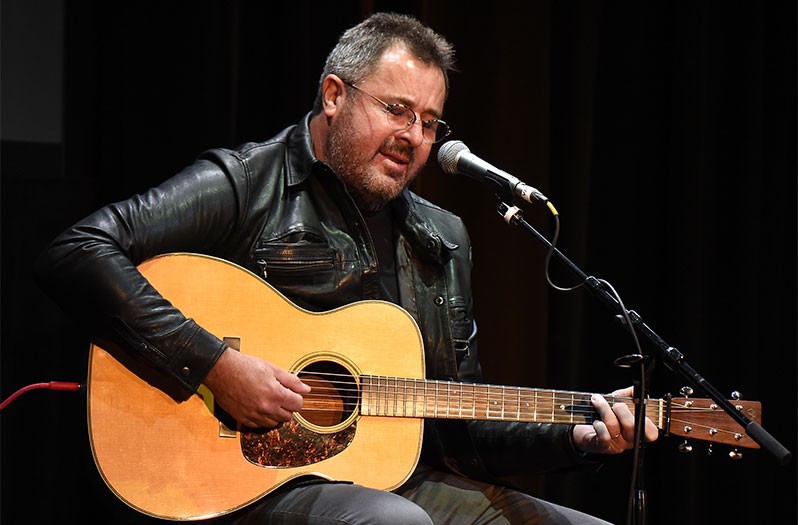Each year, thousands of program directors, label heads and other country radio executives meet in downtown Nashville for Country Radio Seminar. It's a three-day event filled with panels, showcases and networking. It's the biggest party in radio, jam-packed with one-of-a-kind performances and a seemingly endless stream of open bars. But this year, many wondered how the seminar would respond to the movements against sexual harassment and inequality in the world of country radio and country music as a whole.
In a recent article from Rolling Stone, multiple attendees reported sexual harassment and assault both at CRS in previous years. Although CRS has its own sanctioned events, many unsanctioned parties and events happen after-hours in the hotel's suites and guest rooms. These allegations of misconduct came just weeks after Kirt Webster, formerly one of the most powerful public relations executives in Nashville, shut down his PR business after former clients and employees shared their stories of sexual misconduct and assault.
In this post-Harvey Weinstein and Kirt Webster world, many companies and organizations are choosing to speak out on issues like harassment, misconduct and inequality. But CRS has stayed relatively quiet about their stance on the issues that affect their own industry.
Katie Armiger, who was previously signed to Cold River Records, revealed in 2016 that she was groped and harassed by radio programmers and DJs while signed to the label. She says that label owner Pete O'Heeron brushed off her complaints and said she was just "playing a role" when being encouraged to flirt with influential people in country radio to help bolster airplay. Armiger and O'Heeron currently have active lawsuits against each other.
Cold River Records was one of the few labels that also had a CRS officially sanctioned event this year. Their "Disco Dance Off" party featured a 70s theme, a DJ, free food, music from label artist Drew Baldridge, and plenty of alcohol - a theme you'll find in many CRS gatherings.
If you log on to the 2018 CRS app, a "pro-tips for networking" guide advises attendees to have their "favorite hangover remedy" on hand. Open bars are a fixture at events throughout the day, and one of the most popular spots for networking is the hotel bar. Alcohol is prevalent at many conferences, but one of the main goals of CRS is for artists and radio program directors to get face time with each other. Buying drinks and snagging conversations is essential, especially for those female artists who are already fighting against a tired and unproven idea that females, who on average listen to country music more than men, don't want to hear music from other women.
One of the most popular events of CRS, Team UMG at the Ryman is a showcase featuring the label's most established and brightest new artists. Maddie & Tae (only one of two female acts in the 14-act lineup) supplied a stellar performance of their new song, "One Heart to Another." But as they walked off stage, host and UMG Senior Vice President of Promotions Royce Risser hit a sour note with his joke to the crowd.
"One of the best ways for you to get more females on your station is to get two at once," he said. Unsurprisingly, comparing women's talents to a hotel bar's happy hour deal didn't manage more than a smattering of laughs.
Later in the set, Vince Gill took the stage and opted to address the elephant in the room head-on. Before performing the moving "Forever Changed," Gill told the crowd about a "close call" he had in seventh grade.
"I had a gym teacher that acted inappropriately towards me and was trying to do things that I didn't know what the hell was going on. I was just fortunate that I got up and I ran. I just jumped up, and I ran. I don't know why. And I don't think I ever told anybody my whole life, but even what's been going on has given me a little bit of courage to speak out, too."
"We're living in a time right now when finally people are having the courage to kind of speak out about being abused," he continued. "And I think that is beyond helpful, and beyond beautiful to see people finally have a voice for being wronged."
On the third and final day, CRS held two sexual harassment workshops presented by attorney Shelley Greenwald. The first was attended by around 40 people (only around a fourth of those being males) while the second began with only seven participants, all women, with additional participants of both sexes trickling in over the course of an hour. CRS Executive Director Bill Mayne sat in on the first fifteen minutes of the second panel, but did not publicly address those in attendance.
Although a step in the right direction, the workshops were aimed toward corporate managers and more of guide on what to do when an employee brings a sexual harassment complaint forward. While the topic was likely helpful to some, CRS would have been the perfect place to have an open and meaningful discussion on how to deal with sexual harassment and misconduct in country music. Instead, the weakly-promoted and scarcely attended workshop felt more like a mandatory band-aid.
Nashville's NewsChannel 5 reporter Jesse Knutson was scheduled to interview Bill Mayne about the issues of sexual harassment and misconduct during the first day of the seminar. However, the interview was reportedly canceled and his credentials revoked after Knutson explained what his questions would be about. Representatives at CRS said they were revoked due to safety concerns about local media covering the private event. In a report, Knutson says NewsChannel 5 has been allowed to cover the event for years. CRS chose to reinstate his media credentials during the seminar's final day and rescheduled the interview.
Although Wide Open Country received no responses to our request for comment, CRS Executive Director Mayne told Knutson that CRS does "not tolerate, in any shape or form, any sexual misconduct, any improper behavior." He also claims that he was "not aware of one police report, one complaint filed with the hotel or with the CRS office."
While that may be true, it is the fear of retaliation and the risk of career suicide that keeps many from publicly vocalizing abusive or inappropriate behavior. It will likely take years for the country music industry to come out from under its blanket of silence, but it will also take leading organizations to help build the dialogue needed to move forward. This year, during a pivotal moment in both country music and society as a whole, Country Radio Seminar simply missed the mark.




